I Love My Job: Jinxed Owner Mike Supermodel on Building a Philly Empire
The business leader explains how his operation remains so consistently good and reminisces on the early days when he slept in the basement of his first store.

Mike Supermodel at Jinxed Fishtown. Photo by Julie Hanss and Josie Sepel.
If you’re a Philadelphian who loves a good deal, you’ve probably spent some time at Jinxed — four beloved Philly treasure troves that serve up some of the coolest items from generations past. Getting lost in one of the stores on a Saturday afternoon means stumbling on funky relics from the 1800s that are clamoring for their second rodeo. You might also catch yourself lusting over stunning Mid-Century Modern pieces that have endured the test of time.
But customers know they can’t sit back and look for too long. Jinxed’s earned popularity — its Instagram now boasts nearly 60K followers — and accessibility (read: dirt cheap prices) means things vanish fast. Owner Mike Supermodel likes it that way. He’s been at it with the operation for more than a decade. And though he takes great pride in what Philadelphia has become, he reminisces about the “Old Philadelphia,” the days when he hustled nonstop (he still does) and slept in the basement of his first store. People always want to know how Jinxed does it, how the small business remains so consistently good. Supermodel explains.
I grew up in… South Philly around 9th and Shunk.
When I was younger I dreamt of becoming… honestly, a business owner. When I was in the 4th grade, I was selling wax filled bottle caps out of the basement window of our row house. We used to play a game called dead box in the street, and we would fill beer caps with wax so they wouldn’t roll. We would pitch them along the asphalt, and I was selling them for like four for a dollar. I’ve always kind of just hustled things, you know?
A childhood memory that’s always stuck with me is… the way I grew up, I saw a lot of people who didn’t really go and do a lot of things. It really motivated me to travel and try to get as much out of life as possible. I didn’t really have too many examples of that, but I knew that there was more out there. That really pushed me. I don’t have a story of some old man handing me a baseball bat one day and then, you know… [Laughs]
My go-to movie of all time is… Caddyshack.
I got involved in retail… out of high school when I worked at a pet store. But I would say my first real experience where I knew it was something I enjoyed was when I ran a store called Rock and Roll Plus on South Street in the late 90s and early 2000s. I tried to actually buy that store on a deal after about six years. That’s when I knew I couldn’t work for anybody else. He told me he’d sell me the business, but when the agreed upon time came, he was like “You know what, I want to wait another year.” That’s when I was like I’m out; I can’t do this anymore. I opened up the first store within a year.
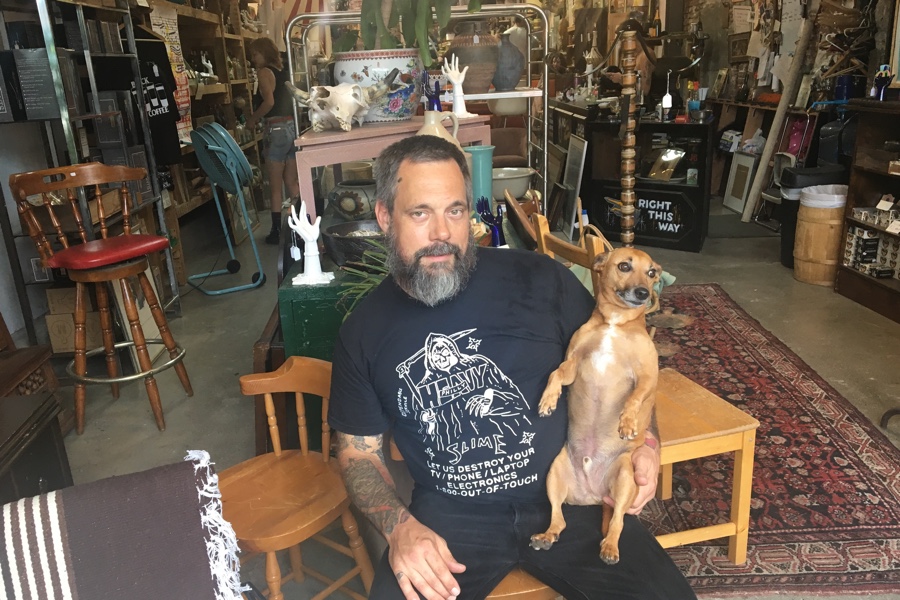
Mike Supermodel with his dog Ronnie at Jinxed Fishtown. Photo by Julie Hanss and Josie Sepel.
Owning a business in Philly is… the best. Each neighborhood is like its own ecosystem, so people don’t generally have to leave where they are to get what they want. For Jinxed, I feel like we become part of each neighborhood we’re in.
But because Philly is also huge, there’s a large population to draw from, which allows us to get best of both worlds. You can still make a mark in Philly if you work hard. But if you go to New York, I feel like you’re lost in the shuffle. And if you go to a town or a city that’s smaller than Philly, nobody even notices or cares. [Laughs] Maybe that’s a little harsh… But Philly has everything. It’s such an old city that whatever you need is here. A lot of it is buried under layers of time, so, to get it, you have to work hard for it.
If you open yourself up to the city, the city will open up to you. And that’s why I’ve had issues with a lot of the newer folks moving in. They seem to only patronize or interact with what’s new — what they read about in the paper, and what’s hot, what’s coming in. But there are things that are just as good or better that have been here for 10, 15, 20, 30, 50 years that they don’t feel comfortable with because they haven’t been here very long. But if they were to try it, and interact with people in those businesses or positions, everything opens up.
Philly is friendly, but you have to prove yourself, and I feel like a lot of new people are not willing to do that. Just because they overpaid for their house, they think they’re entitled to a little extra. [Laughs]
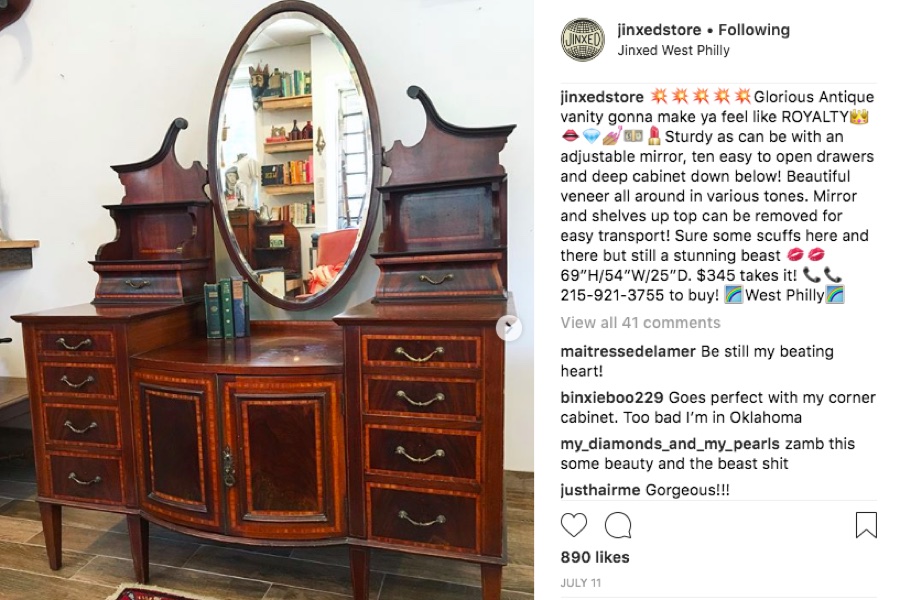
Jinxed Instagram (@jinxedstore) post.
Jinxed is unique because… we don’t have a specialty. We use variety store to describe ourselves. When I was a kid, we had a grocery store on every corner, but each one of them had something different, so they used the term variety store. With us, I let our employees have a lot of say over what we sell. I’m 45, and people on my staff range from my age down to 22. What I like may not be what someone who’s 22 likes or what somebody who’s 32 likes.
The first piece of furniture I was really proud to sell was… it might sound silly, but it was a 50s-style chrome kitchen set, table and chairs. The thing is, I bought it from some guys under the El around K&A because when we started we weren’t always doing vintage. We sold t-shirts; we sold artwork; and, we sold books. When we were at the Piazza, we shared space with an art gallery that took up half of it. When they left, we had to fill the space. I had always bought vintage myself, and had always loved it and was like, “well we have all this space, lets just give it a try.”
We went from buying two pieces, to four pieces, to 16 pieces, to now four stores. And I remember the reaction when people came in and saw the set. It was, “Oh wait, you’re selling vintage now?” It was so good, and I thought, “Oh, we can do this.”
The most random thing we’ve sold at the store is… a coffin with a window for the face. It was all filled with straw, and the straw still kind of had the impression of where a body was. It was from a funeral home, was never dug up, but I think it saw some action. Where I got it from, nobody wanted to touch. Since everyone was afraid of it we got it really cheap and sold it really cheap.
We also had a 15-foot unicorn. It wound up in a salon in Chinatown from what I’m told. But that thing was really cool. It was there for a long time, but I guess 10 years ago, 2,500 bucks seemed like a lot of money. But not that everything is a little more expensive and we never changed the price, people are like, “2,500 bucks? I’ll take two!”
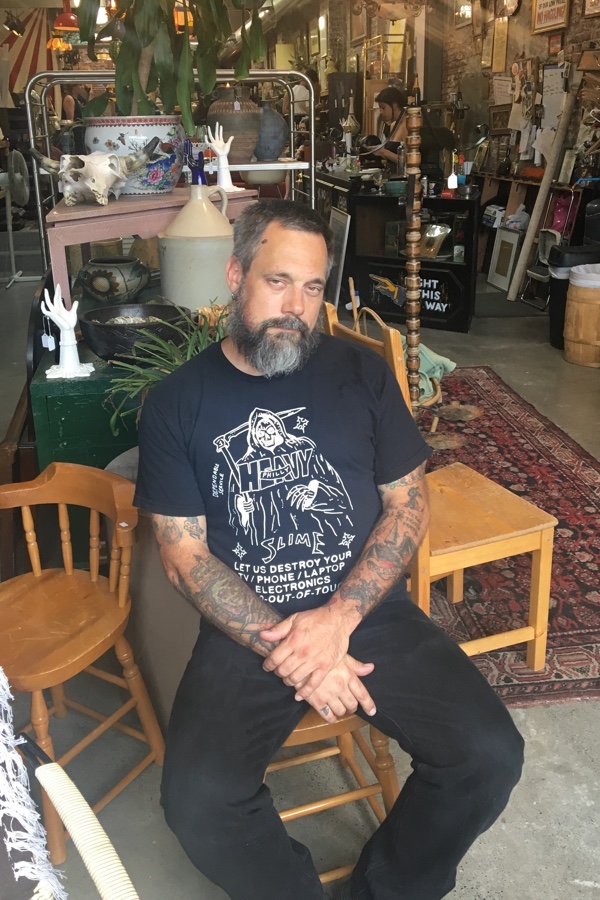
Mike Supermodel at Jinxed Fishtown. Photo by Julie Hanss and Josie Sepel.
My love for vintage and antique goods comes from… the way I grew up. I just didn’t grow up with a lot of new things out of necessity, but what I realized as I got a little older was newer wasn’t always better.
A lot of the stuff that was secondhand was actually better quality than what you could buy in the store. I was able to develop that from a young age and buy things that were repairable and not disposable.
When you move, you could go buy everything in your house from Ikea. But the next time you move, you know half of that stuff is going to be out on the curb. But if you come to us, you may spend a little less than Ikea, or the same as Ikea, but you’re not going to want to give up your ornate coffee table or your 75-year-old dresser that that still lasts. For me it’s all about that up cycling and the durability of goods.

Mike Supermodel. Courtesy photo.
A big lesson I learned from the early days of the business was… have a strong staff. I pretty much work all the time, and it’s not ever going to be enough. You can’t grow unless you have people that you trust representing you at the store. They can’t be people that come in and want to just punch the clock, turn the sign around from “Closed” to “Open,” and just sit there and wait for people to come in. They’ll be the death of you because all they do is take away from the business. The people who want to be creative and wanna just come from a more positive place, they’ll actually help you. I absolutely couldn’t have done it without a lot of the early staff I had when we started to grow.
The hardest part about owning a small business is… the backend stuff, like bookkeeping and taxes. Nobody gets into business because their dream is to do that stuff. I love to buy and sell furniture, deal with customers and clean stuff up to make it ready for people’s homes. And at the end of the day, if you don’t have any energy to reconcile your books, you better hire somebody because at some point they’re going to come knockin’.
When I’m not working I usually… travel. [I travel] wherever presents itself as an opportunity. I’m fortunate that I have a really good group of friends that is pretty active. We like to do stuff together like grab cheap flights and hotels, and disappear for three days. This way you can reset, come back fresh.

Mike Supermodel with his dog Ronnie at Jinxed Fishtown. Photo by Julie Hanss and Josie Sepel.
We don’t reveal where we get our pieces from because… I don’t want us to compete with our own customers who are only going to see half of the picture. A lot of places we go aren’t really open to the public, which is a part of it. But the places that are, it’s like you may see what we buy a piece for, and then when it’s in our store you may be like, “Well wait, why are they charging that?” We’re trucking it. We’re moving it and more. When we happen upon a customer where we’re acquiring things, they kind of always see half the picture whereas a lot more goes into it than meets the eye.
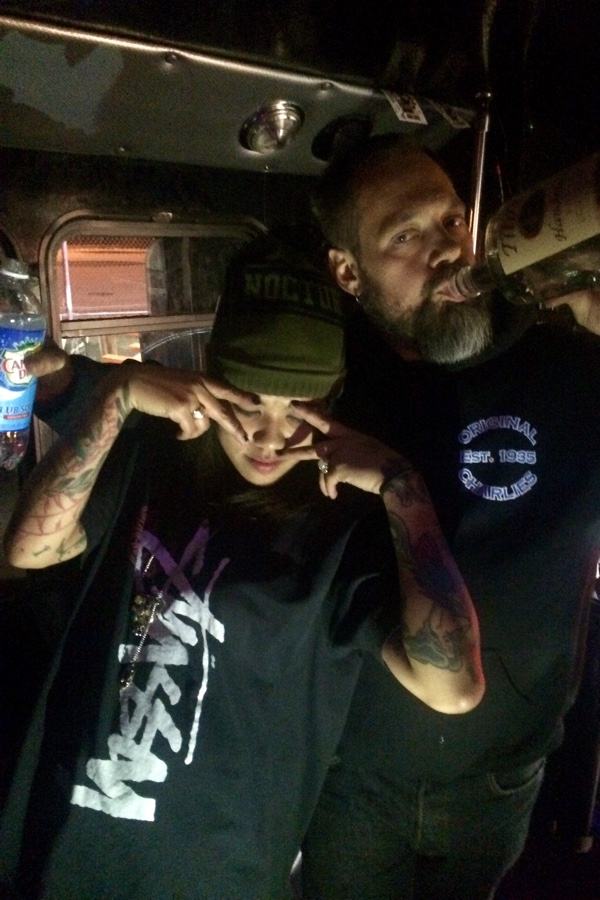
Mike Supermodel drinking Tito’s and club soda. Courtesy photo.
Reality TV has made this really crappy. Because now everybody thinks, “Well, I could do this!” And it’s like… you kind of can’t. [Laughs] Everybody wants to get into it, but not on my time. [Laughs] We have really earned what we do. So it’s not to be exclusive, but it’s to be exclusive. [Laughs] Not everybody needs to be behind the scenes because then you don’t have an audience, and then there’s no show.
If you’re getting me a drink at the bar make it a… Tito’s and club, tall and weak. With a lime.
Something people would be surprised to know about running the stores is… we take a lot more time than I think people realize in curating the pieces for the neighborhoods we are in. For Passyunk Avenue, since there are South Philly homes and then those homes are then generally divided into apartments, we go with smaller, portable furniture that we know will fit through the front door. Or, in West Philly, where you have larger Victorian homes — and even if they’re chopped up a little bit into apartments — people have space. We may be more inclined to send some bigger pieces there, like dining sets. And same with Fishtown, where a lot of people are moving into lofts and doing a lot of construction where people need to fill a home.
The operation has remained only in Philly so far because… I was born and raised here. I have a really good understanding of the different neighborhoods, and what they want and can support. We opened all of our locations in a really tight pocket, in like a year and a half because I saw everything was about to explode with more people moving here and with all the construction. I wanted to drop an anchor into the neighborhoods that I thought were a good fit for us, and then let everything build up around us, which has happened. That’s the main reason for remaining only in Philly, but I’m totally open to other things if it works. It really has to be the right situation.
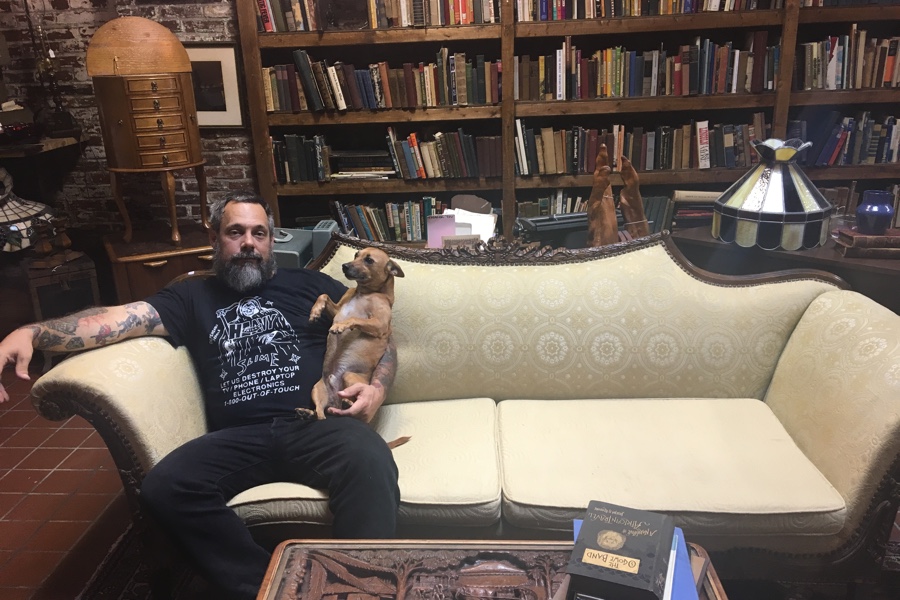
Mike Supermodel with his dog Ronnie at Jinxed Fishtown. Photo by Julie Hanss and Josie Sepel.
Pricing for our items… is a constant internal debate between all of us. The factors we use are what we paid for the item, what condition the item is in, and the wow factor of the item. We try to keep things really accessible.
Our Instagram presence is… accidental. We don’t use hashtags. We’ve never bought followers. I can’t say we’re the first people selling things on Instagram the way we are, but I think we gotta be close.
It occurred to us that we should use Instagram since we have all these items that are one of a kind. Then it turned into an online word of mouth situation, with people [tagging] their friends in the comment section of a post. If they didn’t need the table we posted, they had a friend who did.
We didn’t come up with a marketing strategy that said this is how we will approach Instagram. We just got in early, rolled with the punches, and this is where we are now, which is just under 60,000 followers.

Jinxed Instagram (@jinxedstore) post.
Something that annoys me about Instagram is… that they changed the algorithm and took the “Insta” out of Instagram. With the old one, everything would be in chronological order, and you could reach all of your followers. Now they’re using a lot of different factors that are pretty esoteric in terms of how things get displayed on people’s feeds. You get a post from us from two days ago, and then it gets followed further down the feed by a post from 40 minutes ago. Sometimes people call us about items we posted three days ago.
I go by Supermodel because… back in the 90s I had a punk rock record label that was called Supermodel Records. We did a bunch of shows around the city for the bands we had. So just through word of mouth it became Mike from Supermodel Records, then Mike Supermodel. You can’t give yourself a nickname. That’s not how it works. [Laughs] It was legit. And I’m not the most handsome guy, so it’s not that easy. [Laughs]

Mike Supermodel with the Philly Phanatic. Courtesy photo.
The last time I was really, really happy was… when I was swimming in Georgia earlier in the summer. That was pretty great. I also [recently] saw Sleep at the Electric Factory, and I was really glad to see those guys live.
I’m inspired by… always being able to potentially go out and see something I have never seen before. Be it what we go out and find for work, or just in life in general. I always try to travel and expose myself to different stuff because it’s the only way you learn and grow.
The job keeps me inspired to go dig through a basement or go to a barn auction 100 miles away because I might see something I’ve never seen before. It happens all the time. It’s never a chase about money, and it’s never a chase about rep. This is a business where you can always see something new, and it’s because you’re seeing something old. Something that got tossed into the trashcan of history, and somehow it popped back up. And then to be the conduit that passes that cool stuff on to someone who also appreciates it I think is what gives me the inspiration to keep going everyday.
If you came to my home, you’d notice that the décor is… pretty basic, to be honest. I get my fix at work. I live in a small house, and I guess the things that I collect the most are smaller knick-knacks. But my furniture is nothing special. The only thing that’s interesting is the first thing I trash picked, maybe like 30 years ago. It’s a medallion crystal lamp that I rewired and strung all the crystals for. And I just hold on to it because it is the first thing I literally pulled out of the trash.
A Philly restaurant in my rotation that I can vouch for is… Frankie Bradley’s. It is always consistent, and anything else from Mark Bee. But the way the city is now, it’s hard to miss. If a restaurant is not good, it won’t last three months. Everything in the city is so good right now. It’s a really great time to be living in Philly.
I wish I had more time to… be in the stores, and be in better touch with good customers, and do little stuff like repairs and really tending to our merchandise more. But I don’t have the time because I have to keep the store stocked. As soon as [an item] hits the ground, my staff is cleaning it up and taking care of it, doing all the stuff that I used to do. Then I’m off trying to find what’s next.

Mike Supermodel at Jinxed Fishtown. Photo by Julie Hanss and Josie Sepel.
Advice I’d give to anyone starting a business in Philly is… don’t quit. You have to change it up all the time. If you give your idea a chance and it’s not taking hold but you want to stay in business, you have to figure out what works for you that customers want.
For three months, I lived in the basement of my first store. I would take a shower at my girlfriend’s house. I did that because I could not see myself working for anyone else. There’s no shame in working for someone else. If you can see yourself working for somebody else, and you’re in business, you probably should go work for someone else.
If you’re wired to do this, if you’re wired to hustle and be independent and not have a boss, Philly will reward hard work. But if you just kind of show up, and you just started some Kickstarter, and you just had an idea one day and your heart is not really in it, Philly will sort that out as well. You will not last.
People look at us now and say, “Oh, you guys are doing great.” Yeah, but we’ve also been a store for 14 years, and for the first like seven, nobody shopped with us. Nobody cared. I was all strung out on credit cards and not making my rent, and like I said, literally living in the basement of one of the stores, but I couldn’t quit.
I’d say for anybody who’s starting a business in Philly, it’s the best possible time. I never thought that I would see times like this in Philadelphia. It was so depressed in the 80s and 90s with people moving out. Nobody wanted to be here. If you look at pictures from 20 years ago, it’s a completely different city. It made me feel like I wanted to be born 100 years ago when things were booming at the turn of the century. And now, it’s actually happening again.
It’s definitely more expensive now to get a start, but the reward is bigger as well. I would also say don’t wait. If you’re going to do it, you have to do it now. Things won’t slow down for a long time and things aren’t going to get cheaper for a long time either. So if you’re trying to get in, and if you have a good idea and can make it work, do it.
Something the team is trying to get better at is… really letting people who are recent moves to Philadelphia know that we exist and let them know what we do. Word of mouth has been great. Something that is actually bad for us is that we have been around for a long time. We don’t really see the Best Of awards like we used to even though we’re still the best. What’s new and shiny gets people’s attention. My staff knows that we do what we do better than anybody else in this city. But when you’re around and you just become a model of consistency, the attention fades. We always make sure the stores have good, fresh, unique merchandise. We don’t want to fade into the background like so many other older businesses have just because something new and shiny opened up a block away.

Mike Supermodel. Courtesy photo.
I always carry… three dice that are made of bones so I can play cee-lo. They’re always in the pocket of my jeans.
If I weren’t in this business I’d probably be… in the trades. I need to work with my hands to some degree. I need to have at least somewhat of a blue-collar job. I’m just not a white-collar person. No shame in that at all. It’s just not for me.
My employees respect me because… I will never ask them to do something that I wouldn’t do. I’m not above any job. I still clean the bathroom, and I still load the trucks. I still move furniture. There’s nothing that’s beneath me that I want them to handle just because like I don’t want to deal with it. And I’m the person that they go to when things are bad.
In five years the business will… transition more online. I know of some other dealers that I had good rapports with that closed their stores and moved them online, just because of the lower overhead. If you can find a way to tap into a national audience for what you’re selling, you can make more money.
But it’s not what interests me. I like having brick and mortar stores. I like being old school about stuff, but in the next five years, that’s not where we’re headed. And as far as the business goes overall, I think prices are going to go up because things are much more scarce than when we started. Selection has changed dramatically. Prices have gone up because they only made so much of these items, and as people pass or move to Florida and downsize their homes, there are only so much of those people. At some point, everyone from that generation is gone, and so is their stuff. As time goes on, when you start to get into the 90s, they really didn’t make a lot of cool furniture. [Laughs] It’s pretty basic stuff, so when it’s like 30 and 40 years old, I’m wondering, is anybody going to want this?


